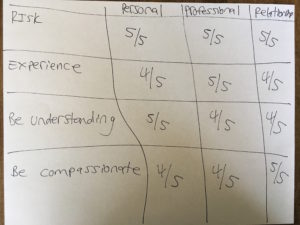by Sam, Management 3.0 Team
One of the first things I do with my coaching clients is that I get them to define their values. It’s something that both baffles and assures me when they tell me that they’ve never even thought about it before. It baffles me because we need our values to help form the core of who we are and it assures me because I know that once they dig deeper and are able to define what’s important to them, they’ll have the necessary tools to live happier, more productive and fulfilling lives.
Why should we care about company values?
In this article we’re not only going to delve into the ‘world of values’, but we’re going to take it one step further. We’re going to see if we’re actually living our values.
Also Read: 12 paths toward happiness
What are values?
The dictionary defines values as:
Principles or standards of behaviour; one’s judgment of what is important in life.
I’d like to add that values are the foundation that make up who we are as people and that our values create the basis for how we want to live our lives and conduct ourselves.
Whatever your final values are, they have to be things that you truly believe in
So why are values important?
One of the main reasons why values are so important is that they act as our moral compasses. They help guide us and they give us direction both personally and professionally and they help give us a sense of identity and purpose. They also help us in making decisions.
Also Read: Are you living a purposeful life?
It’s not hard to make decisions when you know what your values are.
Roy Disney, former top exec at the Walt Disney Company
If you think about it:
- How hard is it for you to be decisive?
- How hard is it to commit to decisions that you’ve already made?
When you know what your values are, it’s a lot easier to make decisions because you’re able to answer the question: Is this in line with my values? If you have no idea what’s important to you then you have nothing with which to measure your actions.
Also Read: How decisiveness and motivation are intrinsically linked
How can we define our personal values?
Some theories say that the best way to figure out our values is to think of a story or situation where you felt happy. Happy Melly founder, Jurgen Appelo, recently asked our entire team for “one example of what makes you feel good working with Happy Melly and you wished that every day was like that.” Our values were rediscovered and emphasized among those stories.
Learn more about Values in a Management 3.0 Foundation Workshop:



Thanks for writing and sharing this article Sam! If we take our values seriously and use these tools in daily life – it’ll make quite an impact on the level of happiness and quality of our lives.